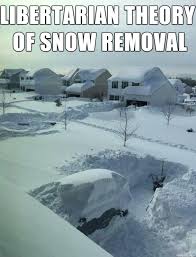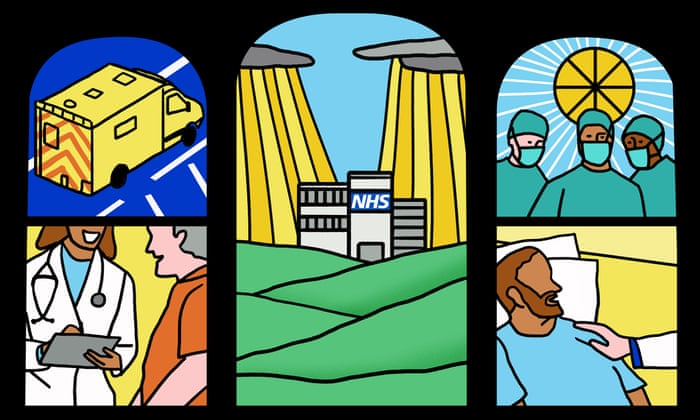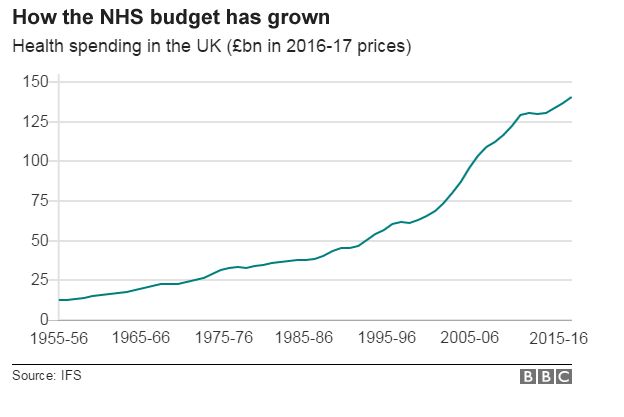I remember seeing this cute little meme posted, without irony, on facebook a couple years ago.

If people choose not to buy into the system, when the snow falls eventually come, the company will drive by houses that are not on their register and don't have a snow medallion on display, or they will bill them out of pocket for a far larger sum than the original insurance fee to clear their driveway, offsetting the costs for everyone else. Perhaps they will think better in future. Even so, they will not necessarily be stranded - they can pay the neighbours children to take shovels and clear it like in the old days.
Problem solved.
Similar arrangements could be made for other services considered "public goods", like municipal garbage removal. For things like street lighting, which are near impossible to exclude those who do not pay for provision of, the medallion system would allow neighbours to apply social pressure to free riders without applying the use of coercion to subtract funds. Those who don't have theirs on display might attract disapproving looks, or have people round saying, "hey man, you are taking money out of everyone's pocket, when everyone pays, everyone pays less." With the technology we have today, it would be easier than ever to apply pressure to those who shirked the responsibility of sharing in the costs of local services they benefit from. The local shop could choose not to serve them and they may need to drive further to the supermarket which will not be worth the hassel of not buying a medallion. Their neighbours could choose not to allow them to collectively buy other services unless they paid in, meaning they would have to make their own arrangements which would prove costlier than choosing not to cooperate.
Clearly the fact that the picture highlighted the failure of a state program escaped the OP.
More seriously though, it's hard to see how the removal of snow would pose any problem for the private sector at all. Some entrepreneur (or community serviceman reprisenting a nonprofit organisation) comes round the neighbourhood and asks if people are willing to contribute however much (or little) would be necessary to insure them against heavy snows. If necesseary, the organisation could draft a contract which says if the necessary amount of people to fund the program is not reached, the people who agree do not have to pay.
Everyone who does pay up gets placed on a register, and gets a nice big siver snow-flake medallion to put on their mailbox or gate to show off to their neighbours that they have contributed. If some people can't afford to pay they can be offered a discount rate, or perhaps they could be included on register in return for agreeing to volunteer for the snow removers should their help ever be needed.
More seriously though, it's hard to see how the removal of snow would pose any problem for the private sector at all. Some entrepreneur (or community serviceman reprisenting a nonprofit organisation) comes round the neighbourhood and asks if people are willing to contribute however much (or little) would be necessary to insure them against heavy snows. If necesseary, the organisation could draft a contract which says if the necessary amount of people to fund the program is not reached, the people who agree do not have to pay.
Everyone who does pay up gets placed on a register, and gets a nice big siver snow-flake medallion to put on their mailbox or gate to show off to their neighbours that they have contributed. If some people can't afford to pay they can be offered a discount rate, or perhaps they could be included on register in return for agreeing to volunteer for the snow removers should their help ever be needed.
Problem solved.
Similar arrangements could be made for other services considered "public goods", like municipal garbage removal. For things like street lighting, which are near impossible to exclude those who do not pay for provision of, the medallion system would allow neighbours to apply social pressure to free riders without applying the use of coercion to subtract funds. Those who don't have theirs on display might attract disapproving looks, or have people round saying, "hey man, you are taking money out of everyone's pocket, when everyone pays, everyone pays less." With the technology we have today, it would be easier than ever to apply pressure to those who shirked the responsibility of sharing in the costs of local services they benefit from. The local shop could choose not to serve them and they may need to drive further to the supermarket which will not be worth the hassel of not buying a medallion. Their neighbours could choose not to allow them to collectively buy other services unless they paid in, meaning they would have to make their own arrangements which would prove costlier than choosing not to cooperate.

